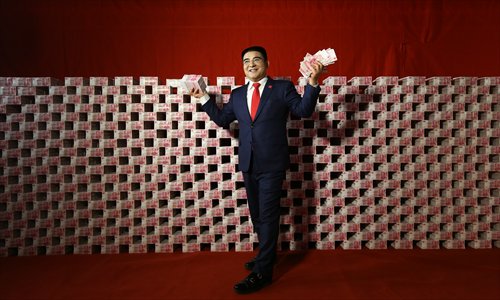Rich talker

Chen Guangbiao. Photo: CFP
Surely people in both China and the United States now know the name of Chen Guangbiao, the 45-year-old multimillionaire/entrepreneur/philanthropist/self-promoter back to China a week ago after his much-hyped trip to the US.
The first week of 2014, "Hurricane Chen" swept across New York offering to invest $1 billion in The New York Times and turn it into a bilingual newspaper that promotes a positive image of China.
"The tradition and style of The New York Times make it very difficult to have objective coverage of China," Chen said in his statement published in the Global Times before his trip. "If we could purchase it, its tone might turn around."
Unfortunately that $1 billion did not help him get through the door of the Old Gray Lady, even though, as Chen noted, he was "very good at working with Jews."
Unfazed by this setback, Chen announced he was now considering buying the Wall Street Journal instead.
That deal does not appear to be happening anytime soon.
However, you've got to give Chen some credit. How much does it cost to dominate the US major media for a whole week? It cost Chen a roundtrip airline ticket, hotel rooms and meals.
"I think China needs someone high profile like me to make the world listen to what you have to say," Chen told the Global Times.
"Not that many Americans had heard of me before my visit. Now I'm told that 90 percent of the entire population knows who I am."
Successful failure
Chen probably doesn't know, but from the US media perspective, his soft-power efforts went "terribly wrong," as Foreign Policy magazine noted.
The liberal American magazine New Republic saw another side to the visit: "but the real story was the American media's reaction to Chen: mockery, fascination, and in no small part, fear.
"For American audiences, it's that fearlessness - some would say recklessness - that makes Chen come off as silly, but also a little bit frightening."
Chen admits he does not really understand the American media.
He had once believed that as long as the price is right, there is nothing that cannot be bought.
Recent criticism of this approach did not bother him, he claimed.
"I don't read any of those negative comments, not even a sentence," Chen said. "I can turn a deaf ear to criticism."
So what exactly did Chen do to earn the latest barrage of comments? After a failed attempt to meet with shareholders of the Times, Chen did what he usually does in China: help people.
And he made sure the world knew all about it by throwing a press conference that began with a patriotic performance.
After singing "My Chinese Dream" karaoke style, Chen showed the media the people he wanted to help: two alleged Falun Gong supporters, a mother and daughter who are self-immolation victims. Chen said he would pay for their reconstructive surgery in New York.
If that did not impress, then try his business card. It's so shiny it blinds, the Chinese media joked.
The card lists a mere 10 job titles including "Most Influential Person of China," "China Moral Leader," "Most Charismatic Philanthropist of China" and "China Earthquake Rescue Hero."
Failure to success
Born in 1968 in Jiangsu Province to a poor family, Chen lost his brother and sister at a young age.
The boy grew up a businessman who built a fortune in recycling. He ranks 406th in China at the 2010 Hurun Rich List.
As chairman of Jiangsu Huangpu Recycling Resources Company, Chen's fortune is estimated at 5 billion yuan.
Such a story might be new to an American, but Chen is very old news back home. For years he has been making charity work into a kind of public theater.
In 2008 when a 7.9-magnitude earthquake hit Sichuan Province and killed nearly 70,000 people, Chen donated his company's bulldozers to assist with the rescue work.
He has also famously handed out cans of fresh air to residents in smoggy Beijing.
Not long ago, before his trip to the US, Chen decorated a television studio with 16 tons of 100-yuan notes to promote a national economic census.
Chen is no stranger to the New York Times. In the last couple of years, Chen has spent $90,000 on advertisements asserting China's sovereignty over the Diaoyu Islands in the East China Sea.
One question seems worth asking: Where does all the money come from?
An article appeared on an online forum alleging Chen's first "bucket of gold" was a scam and detailed how he had violated product laws.
In response, Chen wrote a statement on his Sina Weibo microblog, suggesting that if he had been operating an illegal business, he would have been busted a long time ago.
"My success should be credited to the Communist Party, the opening-up policy and my own hard work," he wrote.
"I know deeply that everything I have today is given to me by my motherland and my people."
His generosity made enemies, Chen said, some of them "tigers," fierce and connected. But he remains undaunted.
"Only those who have survived a cold winter," Chen said, "can understand the warmth of the sun."